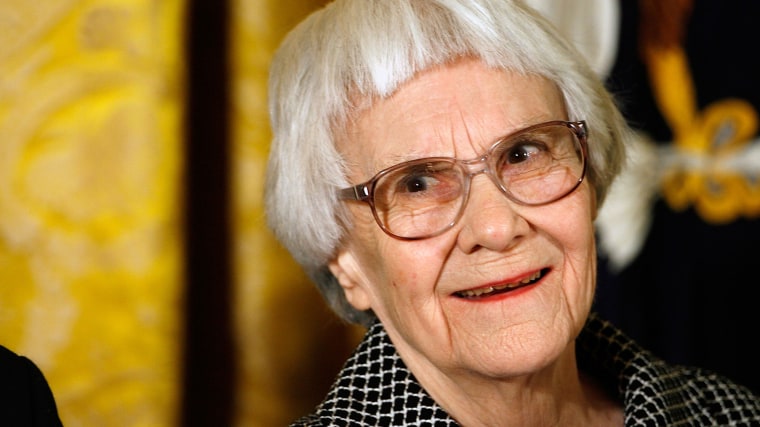Harper Lee, the Pulitzer Prize-winning author of "To Kill a Mockingbird," a literary classic about racial injustice in the Jim Crow South, has died, her publisher said.
The famously reclusive Lee, 89, had been living in an assisted living facility since suffering a stroke in 2007 that forced her to move home from New York, where she had lived for decades. She died "peacefully in her sleep" Thursday night, HarperCollins Publishers said in a statement.
Lee had a love-hate relationship with 1960's "To Kill a Mockingbird," a semi-autobiographical tale of a girl and her father, a lawyer who represents a black man falsely accused and convicted of raping a white woman in the tiny town of Maycomb, modeled after Monroeville.
Told from the eyes of the precocious daughter, Scout Finch, the book was released at the height of the civil rights era and became an instant sensation. It won the the Pulitzer Prize and was adapted into an Oscar-winning 1962 film starring Gregory Peck as Scout's father, Atticus Finch.
But Lee, soft-spoken and strong-willed, bridled at the relentless marketing of her first novel. She stopped giving interviews in 1964, and, despite aborted attempts at a followup book, never wrote another.
"Mockingbird," meanwhile, went on to sell more than 40 million copies worldwide and was translated into more than 40 languages. It was taught to generations of schoolchildren, and brought crowds of tourists to tiny Monroeville, where the local economy now depends on Lee-inspired pilgrims.
"She put us on the map," Tim McKenzie, a director of the Monroe County Museum, told local NBC affiliate WSFA. "People flocked here to see this old courthouse and see the courtroom here, and they wouldn’t have done that if that book had not been written and that movie had not been made."

“The world knows Harper Lee was a brilliant writer but what many don’t know is that she was an extraordinary woman of great joyfulness, humility and kindness," HarperCollins President Michael Morrison said in a statement. "She lived her life the way she wanted to — in private — surrounded by books and the people who loved her.”
Related: 'Go Set a Watchman' Release: Harper Lee and 'To Kill a Mockingbird' By the Numbers
A year ago, her publisher, HarperCollins, announced the discovery of a long-lost manuscript that Lee wrote before "Mockingbird," with many of the same characters and themes. It featured a grown-up Scout and elderly Atticus, depicted as a virulent racist — upending prevailing notions of him as a hero.
Reaction was mixed. Supporters, including many people of Monroeville, which thrives from "Mockingbird"-related tourism, questioned whether Lee — reportedly nearly blind and deaf — truly wanted the second book to be published. Her lawyer, Tonja Carter, who had recently taken over Lee's affairs following her sister Alice's November 2014 death, insisted that her client was happy with the novel's release.
"Watchman" was published in July and became a bestseller, reflecting Lee's — and her first novel's — enduring power.
Born April 28, 1926 in Monroeville, Nelle Harper Lee drew on her experiences growing up a daughter of a small-town lawyer. She attended college in Alabama and studied law, but abandoned those plans in 1950 to pursue her writing career in New York. She supported herself as an airline reservation clerk before devoting all her time to completing "Mockingbird." It took years.
She was joined in New York by her childhood friend and neighbor, Truman Capote, who wrote her into his first book, "Other Voices, Other Rooms." Lee did the same for him in "Mockingbird," basing the character Dill on him.
As "Mockingbird" was being prepared for publication, Capote asked Lee to be his research assistant on a non-fiction crime book. She joined him on reporting trips to Kansas, and helped revise the manuscript for what became 1966's "In Cold Blood," itself a classic.
Lee and Capote's friendship soured in the wake of their mutual triumphs, however. While Capote adored the spotlight and acclaim, Lee recoiled from it. She admitted being frightened about the pressures of repeating "Mockingbird"'s success.
She declined interviews and rarely talked about her life and work, which only stoked the public's fascination with her. She dropped hints of new works, but nothing came of those projects.
But America's love of her did not fade. In 2007, President George W. Bush awarded Lee the Presidential Medal of Freedom. "Harper Lee was ahead of her time, and her masterpiece "To Kill A Mockingbird" prodded America catch up with her," Bush said in a statement Friday.
When her publisher announced last year that it would release "Watchman," it made international news.
HarperCollins Publishers quoted her as saying she hadn't realized the manuscript for "Watchman" still existed, but was "surprised and delighted when my dear friend and lawyer Tonja Carter discovered it."
Days later, as skeptics began questioning Lee's role in the decision, Carter released a followup statement, attributed to Lee, saying she was "alive and kicking and happy as hell with the reactions of 'Watchman.'"
Lee's agent, Andrew Nurnberg, said Friday that he'd last seen her six weeks ago. "She was full of life, her mind and mischievous wit as sharp as ever," Nurnberg recalled in a statement. "She was quoting Thomas More and setting me straight on Tudor history. We have lost a great writer, a great friend and a beacon of integrity.”
